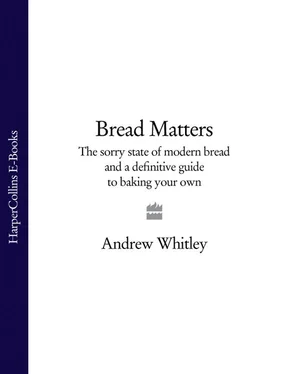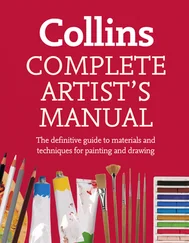Bread Matters the State of Modern Bread and a Definitive Guide to Baking your Own
Andrew Whitley
Fourth Estate • London
To Veronica
Cover Page
Title Page Bread Matters the State of Modern Bread and a Definitive Guide to Baking your Own Andrew Whitley Fourth Estate • London
Dedication To Veronica
Introduction INTRODUCTION This book, as befits its theme, has been fermenting for quite a while. I started the Village Bakery in Melmerby in 1976, when the growing evidence that man could not live by white industrial bread alone was still being ridiculed by the scientific and medical establishments. At that time, none of the bakeries in nearby Penrith made a wholemeal loaf because there was ‘no demand for it’. All my first bread was wholemeal, made with flour stoneground at the local watermill. Partly to reassure myself that I wasn’t completely mad, I wrote a short history of bread on display boards to hang on the walls of our teashop. So began an attempt to understand why people have often chosen, or been forced, to eat bread that was not very good for them and how this might be changed now that we were discovering so much about the role of good food in public health. Towards the end of the 1980s the upsurge of apparent allergy and intolerance to the main ingredients of bread presented me with a baking challenge. I had to go back to the first principles of fermentation to make loaves without wheat, gluten or baker’s yeast. It began to dawn on me that industrial bread might be making increasing numbers of people unwell because it was made too quickly. Since then, what little research has been done in this area has suggested that the longer bread is fermented, the more digestible and nutritious it gets. I hope that something of the same effect can be detected in this book, in which I have tried to pass on the baking knowledge accumulated over 30 years. I have done so not only because making your own bread is one of the most satisfying things you can do but because, as the first chapters reveal, much of what you get in the shops should probably be avoided.
Chapter One What’s the Matter with Modern Bread? CHAPTER ONE WHAT’S THE MATTER WITH MODERN BREAD? ‘A technological triumph factory bread may be. Taste it has none. Should it be called bread?’ ELIZABETH DAVID, English Bread and Yeast Cookery (Allen Lane, 1977)
Chapter Two Does It Really Matter What Bread We Eat?
Chapter Three Taking Control
Chapter Four The Essential Ingredients
Chapter Five Starting from Scratch
Chapter Six First Bread and Rolls
Chapter Seven Simple Sourdough
Chapter Eight Bread – A Meal In Itself
Chapter Nine of Crust and Crumb
Chapter Ten Sweet Breads and Celebrations
Chapter Eleven Easy as Pie
Chapter Twelve Gluten-Free Baking
Chapter Thirteen Growing Old Gracefully
Notes
Index
Acknowledgements
Copyright
About the Publisher
This book, as befits its theme, has been fermenting for quite a while. I started the Village Bakery in Melmerby in 1976, when the growing evidence that man could not live by white industrial bread alone was still being ridiculed by the scientific and medical establishments. At that time, none of the bakeries in nearby Penrith made a wholemeal loaf because there was ‘no demand for it’. All my first bread was wholemeal, made with flour stoneground at the local watermill. Partly to reassure myself that I wasn’t completely mad, I wrote a short history of bread on display boards to hang on the walls of our teashop. So began an attempt to understand why people have often chosen, or been forced, to eat bread that was not very good for them and how this might be changed now that we were discovering so much about the role of good food in public health.
Towards the end of the 1980s the upsurge of apparent allergy and intolerance to the main ingredients of bread presented me with a baking challenge. I had to go back to the first principles of fermentation to make loaves without wheat, gluten or baker’s yeast. It began to dawn on me that industrial bread might be making increasing numbers of people unwell because it was made too quickly. Since then, what little research has been done in this area has suggested that the longer bread is fermented, the more digestible and nutritious it gets.
I hope that something of the same effect can be detected in this book, in which I have tried to pass on the baking knowledge accumulated over 30 years. I have done so not only because making your own bread is one of the most satisfying things you can do but because, as the first chapters reveal, much of what you get in the shops should probably be avoided.
CHAPTER ONE WHAT’S THE MATTER WITH MODERN BREAD?
‘A technological triumph factory bread may be. Taste it has none. Should it be called bread?’ ELIZABETH DAVID, English Bread and Yeast Cookery (Allen Lane, 1977)
A very British loaf affair
Britons consume about eight million loaves a day plus countless rolls, sandwiches, pizzas and croissants. The baking industry is a model of industrial efficiency and British bread is amongst the lowest priced in Europe. Yet if you ask a Continental visitor what they think of living here, likely as not they will mention the lack of good bread.
We ourselves laugh at ‘cotton wool’ bread and put up with tasteless, mass-produced rolls in restaurants, canteens and takeaways. The better-off are tempted by ‘healthy’ loaves fortified with the latest fashionable nutrients, while the poor make do with bread sold primarily on price. If we care about bread, we have a funny way of showing it.
Behind the impressive production figures and the advertising hype of new product launches lies a revealing statistic. We eat less than half as much bread as we did 45 years ago. Well before fads like the low-carbohydrate Atkins diet, people were abandoning bread, and not only because they could afford other foods.
The startling possibility is that British consumers, without their knowledge, have been taking part in a flawed experiment. Back in the early 1960s, the national loaf was fundamentally redesigned. The flour and yeast were changed and a combination of intense energy and additives completely displaced time in the maturing of dough. Almost all our bread has been made this way for nearly half a century. It is white and light and stays soft for days. It is made largely with home-grown wheat and it is cheap. For increasing numbers of people, however, it is inedible.
This book uncovers what goes into the making of a modern loaf and charts the changes that the industry would rather we ignored. As technology finds ever more ingenious ways to adulterate our bread, so science is revealing the havoc this may be causing to public health. Recent research suggests that we urgently need to rethink the way we make bread.
If you are dismayed at the covert corruption of our daily food, you may agree with me that bread matters too much to be left to the industrial bakers. More and more people are taking control over their lives and health by making their own bread. If you are one of them, or would like to be, the second part of this book contains all you need to know in order to make your own bread, with real taste and integrity, bread you can trust and believe in.
Why would hundreds of thousands of people stop eating bread and eliminate wheat from their diet? Cynics would say that the emergence of private allergy clinics and self-diagnosis by mail order might have something to do with it. For its part, much of the medical profession remains sniffy about the connection between diet and wellbeing. Yet scientific studies do show a surprisingly widespread sensitivity to wheat. This can take an extreme form known as coeliac disease, which is a serious reaction to gliadin, one of the gluten-forming proteins present mostly in wheat but also in smaller amounts in rye, barley and oats. Coeliac disease has a genetic component and, according to the Coeliac Society, may affect as many as one in 100 people in the UK. In his book The Complete Guide to Food Allergy and Intolerance (Bloomsbury, 1998, with L. Gamlin), leading allergy expert Professor Jonathan Brostoff describes coeliacs as ‘casualties of the slow adaptation process between the human race and wheat.’
Читать дальше












